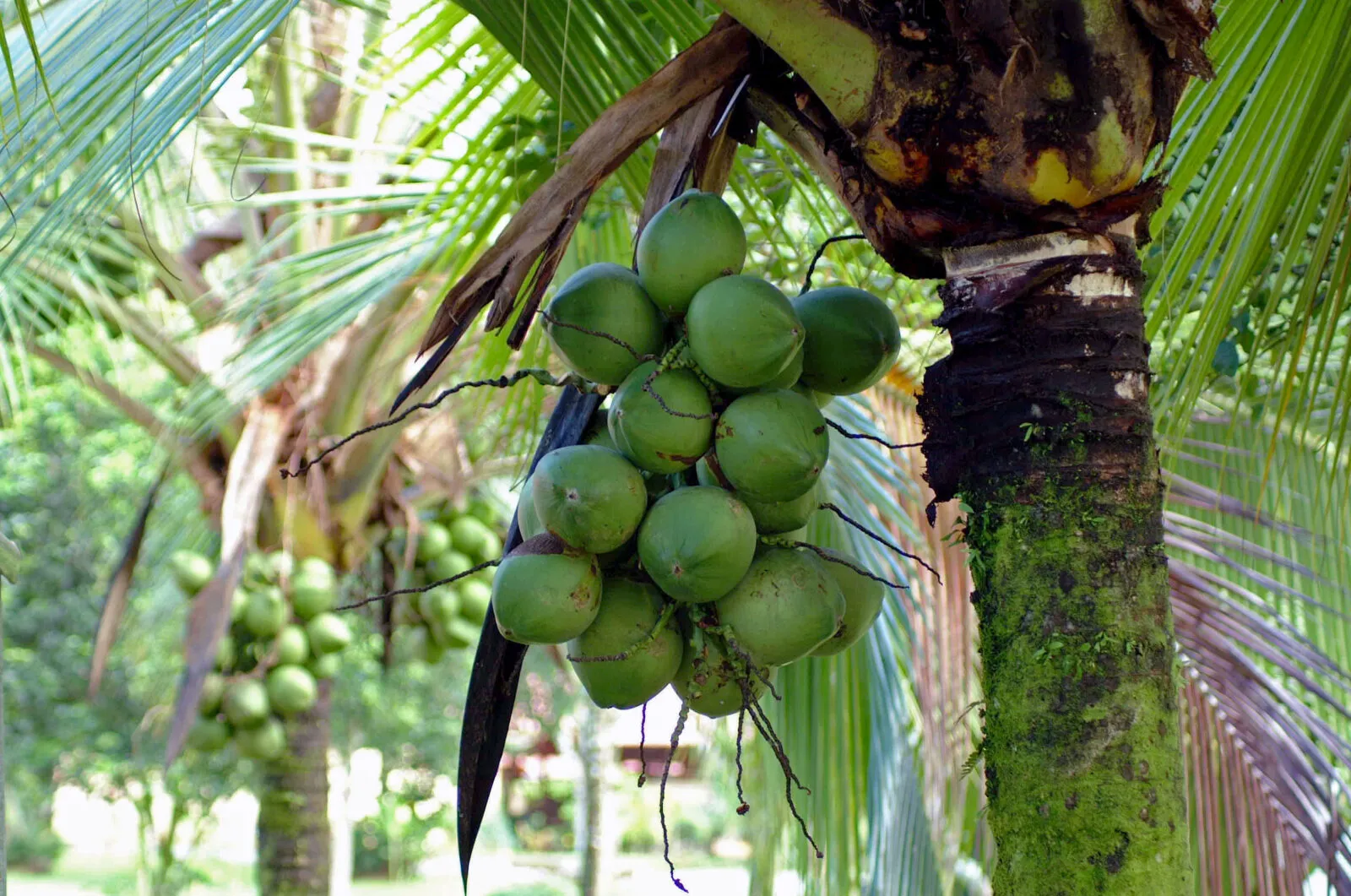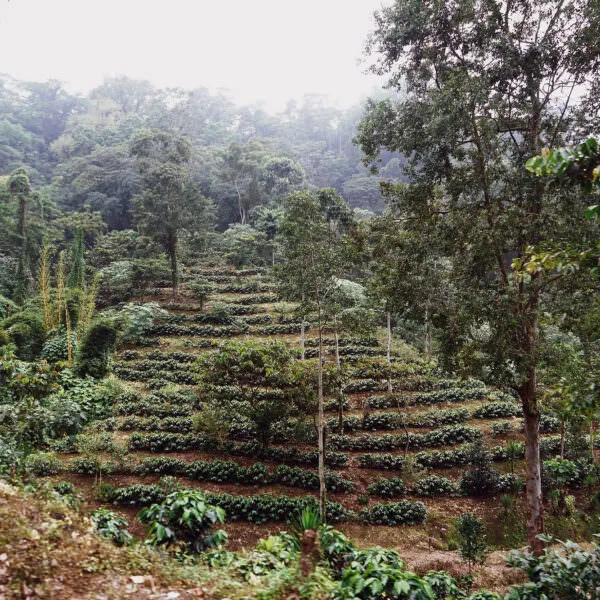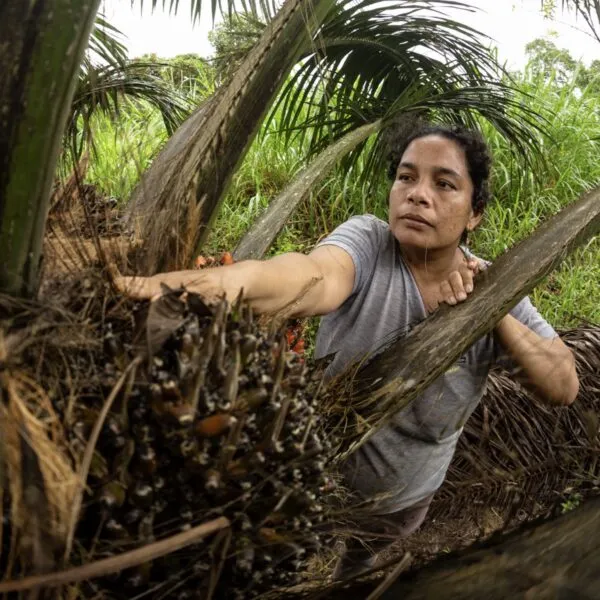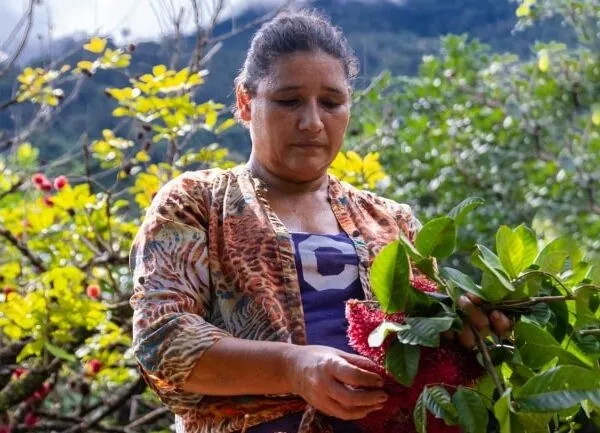The palm tree is often referred to as “the tree of a thousand uses.” From the leaves to the trunk, all parts of this iconic tropical tree have been used for millennia. Perhaps the most versatile part is the coconut fruit (yes, it’s a fruit, not a nut!) Not only does it support the livelihoods of millions of small-scale farmers across the globe, but it is also a key ingredient in countless food, drink, and cosmetic products.
Coconut oil is produced by pressing the meat of the coconut, known as the kernel, which is also used to make coconut milk and dried coconut flakes. Refined coconut oil is generally made from dried coconut (called copra), while virgin coconut oil is made from fresh coconut.
Together, we’re building a future where people and nature thrive. Sign up today and join our movement.
"*" indicates required fields
Challenges in coconut farming
While coconuts bring to mind visions of holiday drinks and beach getaways, everyone’s favorite tropical treat is not all sun and good times. More than 75 percent of global coconut production comes from the Philippines, Indonesia, and India. Here, small-scale farmers—often living in extreme poverty—face many social, economic, and environmental challenges.
Demand for coconuts is on the rise, with the market expected to swell from US$11.6 billion in 2020 to US$23.39 billion in 2027. Since 2015, the Rainforest Alliance has been working with companies and coconut farmers in the Philippines and Indonesia to advance more sustainable practices. Today, more than 60,000 tons of coconut were Rainforest Alliance Certified. Our goal is to transform the coconut industry into one that thrives in harmony with people and nature.
Caught in a vicious cycle
Price instability is one of the biggest challenges facing farmers. In recent years, coconut farmers have seen massive price dips for their crops. Worsening matters, many have aging palm trees, resulting in low and declining yields. This constant struggle to make a decent living, combined with limited knowledge of good farming practices, creates a vicious cycle: when farmers can’t afford to replace their trees, they often resort to cheaper—and harmful—chemical fertilizers to maintain productivity. That’s why the Rainforest Alliance advocates for buyers to give farmers price incentives to invest in more sustainable growing practices.
Rainforest Alliance Certified coconut: training farmers in sustainable agriculture
The Rainforest Alliance supports farmers with training on a wide range of sustainable growing practices—from nature-friendly techniques to boost yields and crop quality, to climate-smart approaches to promote soil nutrition and healthy root stocks. We also provide farmers with the knowledge and skills needed to switch from toxic fertilizers and pesticides to safer alternatives that are better for both people and nature.
Sounds interesting? Take a deeper dive into the sustainable agriculture approaches embedded in our certification program:
- Climate-smart growing practices
- Integrated Pest Management techniques
- Biodiversity-boosting measures like agroforestry
And you can find out more about how our pioneering coconut certification program began here and here.
Stronger protections for forests and wildlife
Respect for forests and biodiversity is at the heart of our “in harmony with nature” approach to farming. Although coconut farming is not driving tropical deforestation on the same scale as crops like oil palm and cocoa, it remains a risk in the sector. That’s why our certification program requires farmers and auditors to carry out a deforestation risk assessment—and no crop can be Rainforest Alliance Certified if it was grown on land that was deforested after 2014. In this way, we are helping companies meet their own deforestation obligations and targets.
Our certification program also supports the protection of native species by establishing wildlife corridors, prohibiting hunting, and taking steps to minimize human-wildlife conflict. In the coconut sector, some studies have found evidence of monkeys being used to collect coconuts. While it is unclear how prevalent this is across the wider industry, Rainforest Alliance Certification strictly prohibits the practice.
Getting to the root of child labor and unsafe working conditions
In some countries, like the Philippines, there is a high risk of child labor on coconut farms and in processing facilities. Here, children are often involved in hazardous tasks, such as climbing tall coconut trees to harvest fruits, using sharp tools to husk and split coconuts, and operating machinery meant for adults. These activities not only keep these children from getting an education, but also expose them to serious safety risks.
Our certification program sets minimum standards for working conditions (including health and safety), and approaches child labor, harassment and forced labor risks holistically by using an assess-and-address approach. The program requires certified farms and processing facilities to set up internal committees to identify, prevent, and monitor child labor, and to quickly remediate any cases that might be found. (Farms also receive training in how to do that.) A third-party auditor evaluates the processes these farms establish and looks for signs of child labor during audits.
An alliance for change: farmers, companies, and consumers
The responsibility for sustainability transformation cannot fall on farmers’ shoulders alone. To drive deep-rooted, systemic change at a global scale, companies and governments need to take a leading role. That’s why we are banding together with farmers, companies, civil society organizations, and government to create impact at speed and scale through shared responsibility.
In the coconut sector, we are also an active member of the Sustainable Coconut Partnership, a global platform working toward a responsible and resilient coconut sector that benefits farmers, the climate, and the environment. Working step-by-step, the organization leads targeted projects and creates best practices that can be applied across the coconut supply chain.
Consumers also have a vital role to play. The journey from farm to shelf can be long and complicated. When you buy coconut products with the Rainforest Alliance frog on them, you can be assured that every step in the supply chain has been certified and is traceable. These small, everyday choices build momentum for a coconut sector that gives back to current and future generations.




